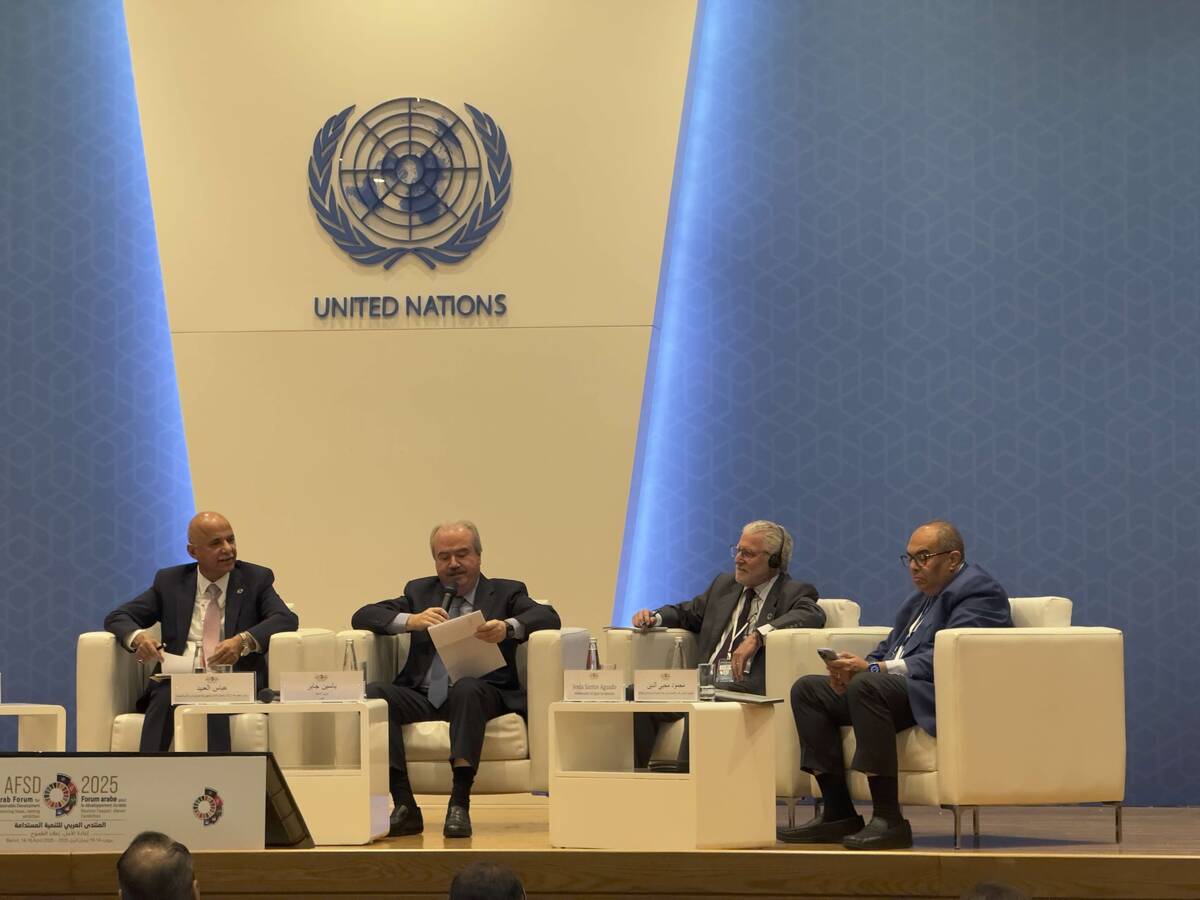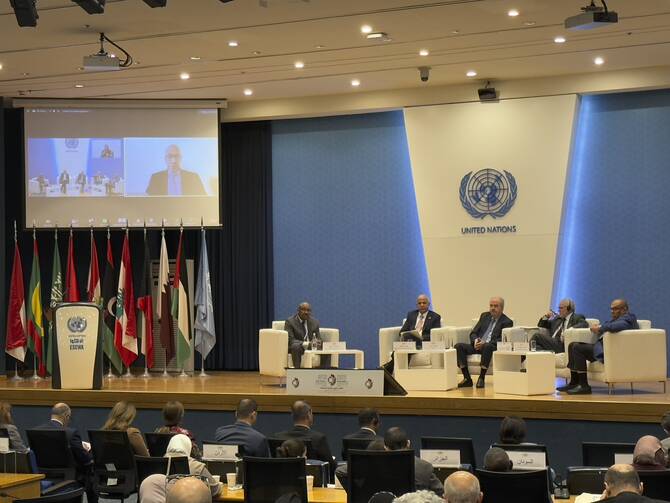RIYADH: Regional leaders and development experts gathered in Beirut for the 2025 Arab Forum for Sustainable Development to assess progress on the UN’s global goals and explore strategies to speed up their implementation.
Held under the patronage of Lebanese President Joseph Aoun, the three-day event—titled “Restoring Hope, Raising Ambition”—is organized by the UN Economic and Social Commission for Western Asia, in collaboration with the League of Arab States and other UN agencies.
The forum focuses on advancing the Sustainable Development Goals across the Arab region, highlighting both achievements and persistent challenges.
As a vital platform ahead of two key global gatherings — the Second World Summit for Social Development in Doha this November and the Fourth International Conference on Financing for Development — the forum helps shape regional priorities around inclusive growth, social equity, and financial inclusion.
Financial inclusion
A central theme of the forum was the urgent need to advance financial inclusion in the Arab region, where approximately 197 million adults — representing 64 percent of the population— remain unbanked, the highest rate globally.
In a panel titled “Advancing Financial Inclusion in the Arab Region,” experts emphasized that true inclusion goes far beyond opening bank accounts—it’s about transforming lives and building economic resilience.
Nasser Al-Kahtani, executive director of the Arab Gulf Program for Development, underscored the need to view financial inclusion as a strategic investment, not just a policy goal.
Sherif Lokman, sub-governor of Egypt’s Central Bank, highlighted the need for national commitment, stating: “Every head of state should look to financial inclusion as something top important. A central bank cannot alone make financial inclusion happen.” He detailed Egypt’s efforts, including training 12,000 bank employees in sign language to better serve people with disabilities.
Maher Mahrouq, director general of Jordan’s Association of Banks, outlined Jordan’s target to raise financial inclusion to 65 percent by 2028 and reduce the gender gap to 12 percent.
Meanwhile, Fatma Triki from Tunisia’s Enda Inter-Arabe noted that her country had already achieved 75 percent financial inclusion in 2021.
The UN Special Rapporteur on Disability Rights, Heba Hagrass, called for at least 80 percent inclusion to ensure marginalized groups are not left behind. “One of the main obstacles to full financial inclusion are policies,” she said, urging reforms to dismantle barriers.

The forum focuses on advancing the Sustainable Development Goals across the Arab region. AN photo
Lebanon’s reform agenda and call for Arab unity
During a ministerial discussion on the road to the Fourth International Conference on Financing for Development, Lebanon’s Finance Minister Yassine Jaber urged the adoption of a unified Arab strategy to fund sustainable development.
“We need a combined effort between governments and international funders,” he said, as he outlined Lebanon’s reform program aimed at recovery from years of economic crisis.
Speaking to Arab News on the sidelines of the forum, Jaber elaborated on the country’s efforts to rebuild trust in its banking sector after a prolonged financial collapse. He identified the appointment of new leadership at the central bank as a crucial first step in restoring public confidence and promoting financial inclusion.
“During the coming weeks, we’ll be appointing a new vice governor and the new bank control commission, so that the whole team will be there to start preparing for a solution to this banking crisis,” Jaber told Arab News.

Lebanon’s Finance Minister Yassine Jaber urged the adoption of a unified Arab strategy to fund sustainable development. AN photo
He added: “Also, we just passed two laws. One amends the Bank Secrecy Law to allow the Bank Control Commission to have more access. The second law regulates the banking system to ensure banks are healthy, have good capital adequacy, and can operate in a trustworthy way.”
Jaber also noted the central bank’s plans to implement a gradual approach to returning deposits, prioritizing smaller account holders. “There’s no banking system in the world that can give back all the deposits to all the people at the same time. So we’ll start with the smaller depositors, then move to higher amounts.”
Reflecting on regional economic collaboration, Jaber expressed frustration over long-standing obstacles. Recalling his role in the 1990s as economy minister, he said: “I still remember how hard we worked … and always had obstacles that actually a lot of them still exist. With globalization falling apart, the Arab world has to create its own regional cooperation system.”
He also underscored the significance of Lebanon hosting the Arab Forum for Sustainable Development, despite the country's ongoing challenges. “The important thing is that this is happening here, in spite of everything, we still have this conference happening. We still have ESCWA here. Lebanon is stretching its hand out for cooperation.”
Jaber concluded by noting Lebanon’s plans to participate in the upcoming IMF-World Bank meetings in Washington, signaling its readiness to re-engage with the international financial community.
Challenges and commitments
The forum also featured remarks from Ahmed Aboul Gheit, secretary-general of the Arab League, who acknowledged that conflict and instability continue to obstruct sustainable development across the region. Yet, he struck an optimistic tone: “Despite these challenges, we see a strong and determined Arab will to transform obstacles into opportunities.”
Echoing this call for resilience, ESCWA Executive Secretary Rola Dashti stressed the need for tangible results over rhetoric. “Hope is not restored through words and promises—it is restored through action, accountability, and justice,” she said.
The Arab Forum for Sustainable Development comes at a critical juncture, as preparations ramp up for the Second World Social Summit in Doha, which will address longstanding gaps in social development. The UN has positioned the summit as an opportunity to “reaffirm our dedication to social progress” and ensure that no one is left behind.
ESCWA’s Annual SDG Review 2025, released during the forum, shed light on persistent inequalities in financial access across the Arab world. The report revealed that only 29 percent of Arab women have access to bank accounts—the lowest rate globally—while just 36 percent of adults use digital payments, compared to a global average of 67 percent.
The review also highlighted Lebanon’s acute banking trust crisis. Despite relatively moderate access to financial services, actual usage drops to just 10 percent, reflecting widespread public mistrust in the financial system.
As the forum’s second day wrapped up, participants emphasized the importance of digital finance, regulatory reform, and stronger regional cooperation to close these gaps. With Lebanon working to restore its financial footing and Arab nations seeking unified solutions, the AFSD has laid the groundwork for meaningful dialogue ahead of November’s global summit.


















